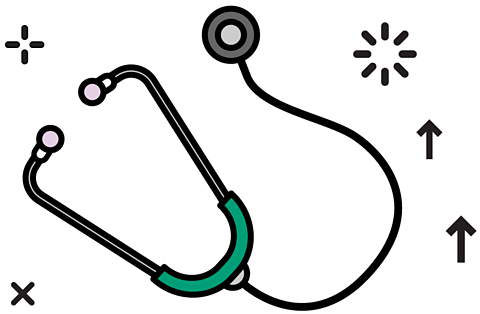
Welcome to The Regenerators.
Produced in partnership with
Career profile
Meet Nathan, a doctor in London.
Nathan is an accident and emergency doctor and also the founder of a sustainable healthcare initiative.
Find out about Nathan's career and how he considers the environment in what he does.
Nathan: My name is Nathan. I'm a doctor, and here's why I love my green career.
I work as a doctor in A&E, and I'm also the founder of Eco Medics, which is a sustainable health care organisation.
Climate change and global heating has an adverse effect on human health. For example, it causes an increase in infectious and respiratory diseases. But what people don't really know is that although climate change has an effect on health care, actually the health care industry itself makes a significant contribution to pollution and climate change.
So, for example, in the UK, the health care industry alone provides around a 20th of the entire carbon emissions of the UK, or around 5%. And if you compare that to the aviation industry, that's 7% so they're very, very similar.
Addressing sustainability in the health care industry is really important to me so that we can make sure we look after patients of tomorrow as well as our patients of today.
Eco Medics is an initiative I set up in response to the mountains of plastic waste we were generating at work. I turned my attention to what we could do something about, and the humble disposable coffee cup. And so I did some digging, spoke to the hospital procurement team and found out that in the hospital, we were using 6 million items of cup and cutlery each year at a cost of over 100,000 a year, and the carbon impact was roughly equivalent to 200,000 trees being planted for ten years.
Now, the hospital has stopped buying all of these cups for the department, so they save a huge amount of money and a huge amount of waste.
As the biggest employer in the UK. The NHS is working to reduce its carbon footprint.
The NHS is committed to reaching net zero emissions by 2040, so it's down to the 1.3 million NHS staff to create a truly green health service. So our aim with Eco Medics is to educate people across the entire health care industry through conferences and webinars about the impacts of the health care industry on climate change and air pollution, and give them the tools they need to do their own projects to really make a difference.
I took chemistry A-level which is essential for a medical degree and biology, which is very helpful. I then went on to university where I completed a medical degree, which is five or six years, depending on which university you go to. And then after medical school, I did my foundation training and completed my life support courses before ending up working in A&E.
There are lots of different roles in the health care industry which don't necessarily require a university degree, you've got health care assistants, some mental health key workers and emergency medical techs who work on the ambulance.
These are all different roles that actually intertwine really well and every single one is so important to making the health care system work as a whole.
My advice is to try and get some work experience in the first instance. The health care industry is vast and there are so many different roles which will suit different people in different ways. So do your research first and then see whether your local service, hospital or ambulance trust offers any work experience or volunteer opportunities.
You never know where it might take you.
Addressing sustainability in the healthcare industry is really important to me so that we can make sure that we look after the patients of tomorrow, as well as our patients of today.
Nathan, doctor
Nathan divides his time between treating patients in A&E and organising conferences and seminars for his initiative, Eco Medics.
He set up the organisation to educate people across the healthcare industry about its impacts and give them the tools to make changes in their own department.
Green healthcare

Our health and the planet’s health are interconnected. Climate change and environmental issues have an impact on public health and healthcare services are often on the frontline.
However, the healthcare industry is also responsible for producing a significant amount of waste and carbon emissions. But the industry is becoming greener, looking to improve healthcare while reducing it's impact, with the NHS committed to be the first healthcare service to reach,

Salary and hours

Doctor salary: The salary of a hospital doctor depends on a number of factors, for example your career stage (how far along you are in your training) and whether you work full-time in the NHS. As a doctor in training (sometimes referred to as a junior doctor) you can expect to earn between an average of ÂŁ28,808 and ÂŁ77,519 per year, but it will vary depending on where in the UK you work and what stage you are at in your training. You can expect to earn much more once you become a consultant.
Doctor working hours: Usually 8am to 5pm for standard days, 8am to 8pm for long days, then evenings, weekends and nights when on call, but these are compensated by days off in lieu during the week.

Entry requirements

To become a hospital doctor you'll need to complete a 5-year degree in Medicine, recognised by the (GMC).
Most medical degrees require 3 A levels, or equivalent. Chemistry is often a mandatory requirement and Biology is preferable. If you don't have qualifications in science, you may be able to join a 6-year degree course in Medicine. This includes a pre-medical or foundation year.
After finishing medical school, all newly qualified doctors must complete 2 years of foundation training. This allows you to work across a broad range of different medical and surgical specialties in order to gain experience.
Following foundation training you can choose an area of medicine or surgery to specialise in. You will then work and train in departments related to your chosen specialty for between 4 to 7 years in order to gain the skills and knowledge you need to become a consultant.
The British Medical Association (BMA) is a professional body that supports doctors in the UK. They have lots of information and advice about , from getting in to medical school to working life as a doctor.
This information is a guide (sources: LMI for All, National Careers Service, BMA)
For careers advice in all parts of the UK visit: , , and

There's more to learn
Explore more careers with ±«Óătv Bitesize and The Open University.
More from The Regenerators
±«Óătv BITESIZE




